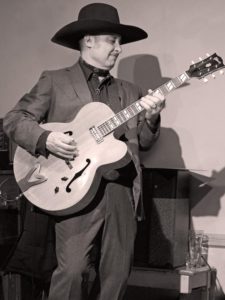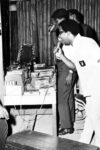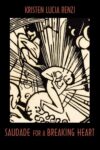The following interview is an excerpt from Fowre: Gone Country, the second volume of a four part series on music by Publication Studio Hudson.
 “Smokey’s Round-up” is a fixture at Sunny’s Bar, a not-so secret but rightfully beloved Bohemian enclave tucked deep into the isolated waterfront neighborhood of Red Hook, Brooklyn. Most Wednesdays, Smokey Hormel’s cut-loose western swing combo wears big hats and plays a vivacious, fluid, rogue strain of old-school honky-tonk late into the night. The close quarters and boogie-inducing musicianship transports Sunny’s into a timeless dimension in which the vibe is free to show its mongrel roots.
“Smokey’s Round-up” is a fixture at Sunny’s Bar, a not-so secret but rightfully beloved Bohemian enclave tucked deep into the isolated waterfront neighborhood of Red Hook, Brooklyn. Most Wednesdays, Smokey Hormel’s cut-loose western swing combo wears big hats and plays a vivacious, fluid, rogue strain of old-school honky-tonk late into the night. The close quarters and boogie-inducing musicianship transports Sunny’s into a timeless dimension in which the vibe is free to show its mongrel roots.
Smokey is a legendary sideman: he’s played in Beck’s band, had a stint in the classic LA country-punk band The Blasters as a young gun, and has racked up studio credits with Tom Waits, Neil Diamond, and Adele amongst many others. When called on to discuss the Round-up and country music, he quickly moves to his formative experience recording with the Man in Black, who he always refers to with reverence as “Mr. Cash.”
Smokey Hormel:…so the reason I did the Round-up is really because of Mr. Cash. He just loved the whole process of learning and performing songs. And being around him, it became contagious. I kind of owe it all to him in a way…he’s like a god!
Alex Spoto: He is like a god! Well, to start out, in your own words, how would you describe the Round-up to a stranger who stumbles into Sunny’s on a Wednesday night? What would they be hearing?
It’s a group of musicians that get together every week to play western swing and other types of American music that they don’t get to play otherwise and it’s very loose because we don’t rehearse, we just learn songs on the spot pretty much. It started off as a five-piece band, but the steel player moved to Texas and we decided that it worked just as well as a four-piece so we kept it that way.
What are some of the songs or artists or recording that you are drawing on as either some sort of foundation or jumping off point for the Round-up?
Well it started off focused primarily on the music of Bob Wills and Milton Brown. Milton Brown being the father of western swing, and his Musical Brownies, who were the template for a lot of bands that followed, including the Texas Playboys. They were the original inspiration to have this band and play that style of music. Then we got a little more ambitious and started doing a little more modern country, songs from the 50s and 60s.
I’ve been doing the Round-up now for over ten years, and what happened after the 2nd or 3rd year is people started dancing. The focus of the band shifted from trying to learn these old songs to “what’s going to please the dancers?” The experience of having people dance when you’re playing this music is so wonderful, and it really changes the whole process of performing because the focus isn’t on the band so much, it’s on the whole room. So that’s been my guide for the last few years: what’s going to keep people dancing.
I’ve been building this repertoire of songs. It started with a list of twelve songs that I knew from Milton Brown and Bob Wills and a couple of Fats Waller songs. Now I think the list is about 250 songs! Every week I’ll bring in a new song, that’s my own personal challenge for myself. When I worked with Mr. Cash, it was all about the thrill of learning songs. So every week I would get a chance to learn a new song and then teach it to the band on the stand, which is to say they don’t know the song until they hear me play it most of the time. It can be kind of rough at first, but they’re good enough musicians that they know what not to play.
I made a voice memo of you guys wrapping up your third set—it was very late on a rainy April night and there was hardly anyone there. You started into “Goodbye Old Paint,” and it was an especially drawn-out version with this “Norwegian Wood”-esque underlying drone, and the drummer was scraping the cymbals, and the song broke down to this spoken word, whispered core, and nobody was dancing, everyone was just holding on to the table, still, transfixed… and then somehow you spun it into a Coltrane-esque, “giant-step” harmonic turnaround and picked it up into a jazz number! How do those different styles—even different styles of country music from different decades or places—how do those coexist within your four-person ensemble? Do you think about that at all or do you just let it happen naturally?
Well, we’re all jazz musicians at heart, or shall I say we’re all fans of jazz music. You mentioned Coltrane; no one can hold a candle to that stuff. But, taking myself out of it, I think all three of those guys are good enough to play in serious jazz ensembles and do.
You mentioned, “Old Paint.” That is a song that would not have gone where it did without us experimenting. I think the first time we did it in a sort of drone-y way, it was just like, “Oh, wow!” For some reason we just broke it down and Charlie Burnham, the fiddle player, turned up the reverb. Charlie is an amazing sort of free musician who is very influenced by Jimi Hendrix, so he comes from this sort of psychedelic world—I wouldn’t even know how to describe his musical style, but he’s very, very free, so sometimes when we open it up it’ll just go in a certain direction where we’re all sort of following. It’s not like any one person is leading. I mean, I guess I’m the leader, but I really like to throw it around and see where they take it.
It’s thrilling to hear traditional, recognizable music expressed in such a fluid way.
I had a really wonderful guitar teacher in high school who had played in Bob Wills’ band. He was one of the original members of the Texas Playboys. His name is Jimmy Wyble and he’s on the original version of “Roly Poly,” “Stay All Night,” he’s sort of legendary. But in the 70s when I was taking lessons from him, he told me one day, “look, we were just trying to play swing music. We didn’t think about whether it was jazz or western swing.” I mean, they were all listening to the same music in the 30s and 40s. When Bob Wills’ band would go on tour on the East Coast, they’d play a gig in Newark or somewhere in Jersey, and then after the gig they’d all hop on a train and try to get up to Harlem so they could hear Charlie Parker. So jazz has always been an important influence on this music.
I’ve found that the western swing label, especially when I wear the big cowboy hat, somehow gives me freedom to do things that I normally wouldn’t dare to do. It’s like in the old, uh…Theatre dell’arte tradition. They would put on these masks and they would become these characters, you know, the mask would dictate the character of the actor. And I feel like that’s sort of what happens when I put on the shirt and the cowboy hat. Suddenly I’m free. And I think that the people in the audience, they’re looking at this guy in 2017 wearing a big cowboy hat and they’re not going to think that I’m serious, you know? We’re in Brooklyn! So it’s very freeing.
Yet you’re playing serious music through that persona of country music. In Nashville, people think you’re serious if you’re wearing a big cowboy hat. There’s lots of posturing with this nostalgic aspect of country music that seems to be part of its identity. The Round-up riffs on some of the oldest, most foundational country music, and you interpret this as “I put my hat on and it frees me up to inhabit this space of the past.”
I don’t think I could ever do this band in Nashville. Maybe I could do it now, but I would’ve never been able to start this thing in Nashville, because…we make so many mistakes! You know, I record our shows, and I’m always trying to find good versions from the show tapes that I can send to my friends in Nashville and stuff, and we’re just all over the place, so… I think maybe that being a fake cowboy in Brooklyn is the best I can do at this point—I don’t think I could pass as a real cowboy. And I’m not a real cowboy! I’m not from Tennessee, I’m not from Texas, I’m from LA [laughs]! So it’s all fake, you know.
That’s the other thing about western swing… it was a product of Hollywood! I mean there’s definitely the Texas Playboys and Milton Brown, but it wasn’t until Bob Wills went to California and he was making movies that he really exploded in popularity. So there is that element of show business to it. Which is not a criticism, you know, I respect that a lot. Part of the problem for me with country music in Nashville is that it is too serious. There needs to be humor. People, especially now, people need to not take themselves so seriously and…that’s the whole thing with dancing too, it’s like—especially for men. It seems like men have a really hard time letting go and maybe being a little bit foolish and doing things that they’re not good at like dancing. So I’m trying to encourage people to loosen up a little bit. If I’m an urban guy trying to sing a Merle Haggard song, it’s not going to be authentic. If I sing about a lifestyle that I don’t really live, someone in that world is going to know I’m bullshitting, so I have to be a little self-effacing. I respect country music, and yet I don’t think it’s so precious that you can’t do it if you’re not from that world. And I’m walking a fine line there, but it’s the same way I feel about jazz, too. I really respect jazz and I love it and, you know, if we’re all up there with cowboy shirts and cowboy hats and we play a Duke Ellington instrumental, it kind of works! Or it can sort of work…
You have an acting background, correct?
I did a lot of plays in the 80s before I got in my first real band. Once I got in that band I didn’t have time anymore to do theater, otherwise I probably would’ve kept going with it. When I was studying acting, I spent most of my time listening to George Jones because there was some emotional thing there that was really…I could suspend my disbelief and get completely caught up in the scene that he was singing about. And the same with Merle Haggard.
Are there any individual songs that immediately come to mind?
Yeah I mean like, Merle Haggard’s song “I Can’t Hold Myself In Line.” I do that song by Johnny Paycheck, “I’m the Only Hell (My Mama Ever Raised).” I mean, those are such great story-character songs that it’s fun to dive in. With George Jones there’s like a million of them…“The Grand Tour.”
I wasn’t inspired to start singing myself, though, until I had to do some guide vocals for Mr. Cash. That sort of busted me loose of the fear—I was kind of forced to inhabit a song and to inhabit a character that I normally would not have. So then I felt like, OK well if I can do that, then maybe I can sing “blue must be the color of the blues” or, you know,“one drink, just one more, and then another.” There are so many great songs. It’s so much fun when you learn a song, you learn the words, and then when you’re singing it, it changes you. You become this character, and if you really surrender to what the song is doing, suddenly you’ve gone places you wouldn’t have gone otherwise, and it’s just so wonderful to have that experience. And that’s what I think kept Mr. Cash going, because he was so ill and he just kept wanting to learn more songs.
But personally, I’m mostly drawn to straight country, the stuff from the 60s and maybe up until the mid 70s, but then after that, then country music starts to sound more like country rock and there’s a whole other thing going on. The character has changed a lot. And really to be honest, I really don’t like new country at all. I mean, I know there’s some good artists. A friend of mine is actually up for a Grammy because he engineered for the Sturgill Simpson record.
Is that Ferg?
That’s Ferg.
He was probably engineering the Cash recordings you did right?
That’s how I met him, yeah. Actually, there was a lot of downtime because Mr. Cash was often too sick to show up. So Ferg and I would just be sittin’ there and he’d be like, “Oh you know this song?” And I’d be like, “Hey, do you know this song?” We’d be trading songs. He’s a great singer and a really good musician! So I’ve learned a lot from him, but I’ve also learned to respect that there’s a whole world there that I don’t know anything about. I went to visit him one time and he took me over to Jack Clement’s house, and I got to hang out with Jack Clement and we did the same thing: we smoked weed and traded songs. And like, it was so great to meet this bohemian guy who lived in that world and who I could totally relate to. When I played him a song he hadn’t heard before he got all excited and then of course we started talking about polka music.
Music builds bridges between cultures and that’s what I think is one of the best things about it. I’ll tell you a crazy story—I’ve been hanging out with these African guys from Senegal. There’s this guy who moved into my neighborhood in Hoboken who has a little art gallery and he has this friend who’s an artist from Senegal. He’s about the same age as me, and he worked for a while as a translator for Texas investors who were involved in oil or something down there and they got him into Merle Haggard. So this guy would sing—he knew all these Merle Haggard songs. And to hear an African guy from Senegal singing “Mama Tried,”—it…it…my mind exploded. It was the greatest thing ever. Because he totally understood the song, it was a completely different culture, but he sang it just as lonesome as Merle Haggard. I mean he was a good singer, but the meaning was there, the emotional content was there. And that’s what a good song is all about and that’s what I’m trying to do, you know, honor the songs.
Can you give me one more peek into your time with Mr. Cash? I’m imagining this guy with a monumental personality that is unmistakable, an archetypal country star, this singular, iconic voice…What was it like to encounter him not in country music USA but in 1990s Los Angeles?
Well, I had sort of two different periods with him. The first time I met him was when he had first signed up with Rick Rubin and that was in ‘92. I was playing with this band called The Red Devils, which was like a garage-y blues band, and Rick was just sort of throwing Johnny, Mr. Cash, in with all these different bands to see what worked. I know that he had had a session with the Red Hot Chili Peppers before us. I don’t think that one went very well. When we walked into the room we had no idea what to expect except that we knew that there was this one song, this Danzig song, that Rick wanted us to do with him. He and June [Carter Cash] walked in and June saw me playing and she walked right up to me and said, “Is that a Gretsch guitar, my momma had a Gretsch guitar.” And I was like, “Really? What did it look like?” And we immediately just started talking about this guitar, and she totally broke the ice. Meanwhile Mr. Cash sort of hung back, happy to have her take all of the attention. He was very shy, you know. I think at that time he was a little bit insecure but also not knowing what to think. I don’t think he knew what to expect. He had just started working with Rick and there was this kind of loud blues band, and he’s thinking, “Oh my god, what am I going to do?” But June was just so great because she put everyone at ease. So right off the bat I felt like, OK, it’s not about him being a hero or anything, it’s about how are we going to make these songs work for him.
One of my favorite things that I ever did, I think it’s probably my favorite recording of mine, is a Steve Earle song called “The Devil’s Right Hand.” I think the band was overplaying a little bit and Rick ended up just using my guitar and Mr. Cash’s voice, so it’s just the two of us. And I’m trying to play like a John Lee Hooker or an R.L. Burnside kind of guitar part, ‘cause that’s all I was into at that time. I was really into Mississippi rural blues from the 50s. And it just fit. His voice, it just fit. And the one thing I realized off the bat is he needs a really strong beat. Like if he knows where the downbeat is, he’s going to be fine. ‘Cause he’s not trying to sing like Johnny Cash, he’s just trying to inhabit the song, and that’s the voice he has. He can’t help it. I’m sure if he thought he could sing like someone else, he would do it, but he couldn’t. He had to be Johnny Cash. He had no choice. It was all about creating a context where it would be interesting but he could thrive.
So what was the second period of your work with him like?
Rick called me to come back and work with him again in the late 90s, and by then his health had really gone down. So the later stuff was all about, you know, here’s this man who’s really ill, and he still wants to sing in spite of his pain and ill health, so what can I do to help him? He still needs the beat, but he needs a lot of room, and he needs gentle support, but you don’t want to make him feel frail even though he is frail, you want to make him feel strong. So it was all a matter of giving him support and letting him find his strength.
Alex Spoto lives in San Francisco. He scribes for the eclectic audio blog Aquarium Drunkard and is a lifelong fiddle man.
This post may contain affiliate links.







